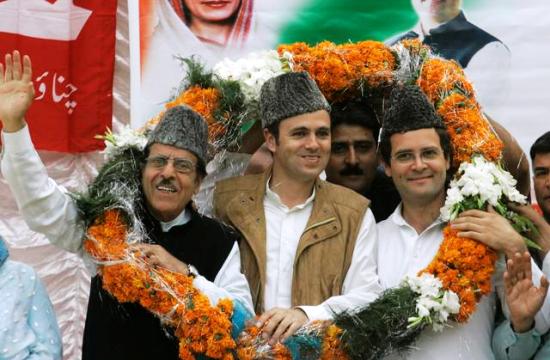by Danish Ahmad Lone
The founding fathers of Congress established it with a democratic and secular spirit. It was organized to furnish the common man with political space. It aimed to absorb all the welfare and development ideologies. But, momentarily Congress has abandoned its primary principles. The common man’s space in the party has shrunken and dwindled.
 Congress party is once again confronting the structural and administrative crisis. The emergence of right-wing politics has waned and declined the space for Congress’s claimed democratic and socialistic protocol.
Congress party is once again confronting the structural and administrative crisis. The emergence of right-wing politics has waned and declined the space for Congress’s claimed democratic and socialistic protocol.
Whether it is Congress party’s prominent members running out of the party or its awful defeats in local and national elections, it appears as if everything is falling apart at the hands of Congress. The party which has enjoyed power for almost half a century is in a deep confrontation where it is struggling merely for its existence and not for its essence. This is really terrible and the uneven
The complexion of politics.
Most contemporary political commentators and reviewers are assuming Gandhian lineage for this slip. They are deeming Gandhi lineage accountable for the ongoing catastrophe which has left the congress party hardly in parliamentary opposition.
But, is the Gandhi family certainly a burden for the Congress party? To answer this query, we have to go back into the history of Indian politics.
Back in the years 1967-1968 Congress was exactly going through the existential decaying and deterioration, that present-day Congress is undergoing. The then central members of the party were similarly trotting after vested interests as the present-day members are coming off. With internal decaying, Congress was losing its superficial shine too.
Unlike the present-day Congress, the then Congress leaders were encountering more sophisticated dilemmas. They were not only suffering interior structural and federal crises but were also confronting economic crises accompanied by mass protests. Internal conspirators and fierce external opposition tried their best to depose the then Gandhi, Indira Gandhi. But she splashed very cautiously by hitting the common man’s mind. She addressed every crisis and managed to recoup both his essence and the party’s political portrait.
Even after the enactment of a disastrous national emergency, her son also wielding Gandhi stamp made it into the prime minister’s office. After him, congress continues in power for almost a decade. Then, how the Gandhi family can be a burden for Congress?
Is Gandhi lineage a liability for the Congress party?
The politics of any country is determined by its masses and not by the political figures of the state. History shows that dynastic politics has been perpetually accepted by the masses. Identical to the external world, the same is the case with Indian politics. People here are overwhelmingly accepting and cheering for dynastic politics. Whether it is Tejasvi’s largest single party knock in Bihar, Uddhav Thackeray’s rise in Maharashtra, Owaisi’s consistent wins in Hyderabad or Omar and Mehbooba’s prominent portrayals in Jammu and Kashmir, the dynasty politics has been always approved and applauded by common masses.
Sometimes when other interests and issues imply more primacy than dynastic politics time gives birth to leaders like Rahul Gandhi who are incapable of nourishing the common man’s interest. Does this mean that it is a Gandhian mark which is making Rahul Gandhi a burden to the party? The answer is total No.
It is his political inefficiency and maybe lack of interest in the field which is slipping them into a plunge. At the same time, Priyanka Gandhi Vadra also a Gandhi is earning more enthusiastic responses and acknowledgement from people than her mother and brother.
People are valuing her even she hasn’t contested any national elections yet. This exhibits that it is not linage but inefficiency which impacts the final results.

Is Congress slipping down because of the Gandhian family?
Presently, Congress is once again in deep crisis. It is struggling for its breathing and not for a beautiful future. Its credibility has fallen. A National Party which has pioneered welfare in the country is struggling to gain an oppositional position in regional politics. Is it because of the Gandhian stamp marked on Congress or some other additional elements which are drowning Congress?
The founding fathers of Congress established it with a democratic and secular spirit. It was organized to furnish the common man with political space. It aimed to absorb all the welfare and development ideologies. But, momentarily Congress has abandoned its primary principles. The common man’s space in the party has shrunken and dwindled. The party is continuing with privileged members not only Gandhis but others are enjoying the privilege too.

Secondly, another facet which directs congress into trouble is the vested interests of its members. Most of its members seem apathetic about its revival to athletic national politics, it appears as if they are concerned about their vested interests rather than party interests. The example from recent Bihar elections is making this assertion stronger where we see right-wing equipped with all its central faces and we hardly see any prominent congress leader campaigning for the party’s welfare. Also, Congress has abandoned communicating and interacting with the local people. The central figures are completely inefficient to cultivate the common man’s interests.
The final and foremost facet which drowns Congress is national media. The right-wing media fought tooth and nail to worsen the already broken image of Congress.
All these inabilities and inefficiencies are plunging Congress into a dilemma. It’s not Gandhi association but Congress’ central, administrative and contemporary undemocratic structure which is barricading congress. Otherwise, Gandhi’s are an asset rather than a liability for Congress.
(Author is studying economics at Aligarh Muslim University. The opinions expressed in this article are those of the author and do not purport to reflect the opinions or views of Kashmir Life.)















